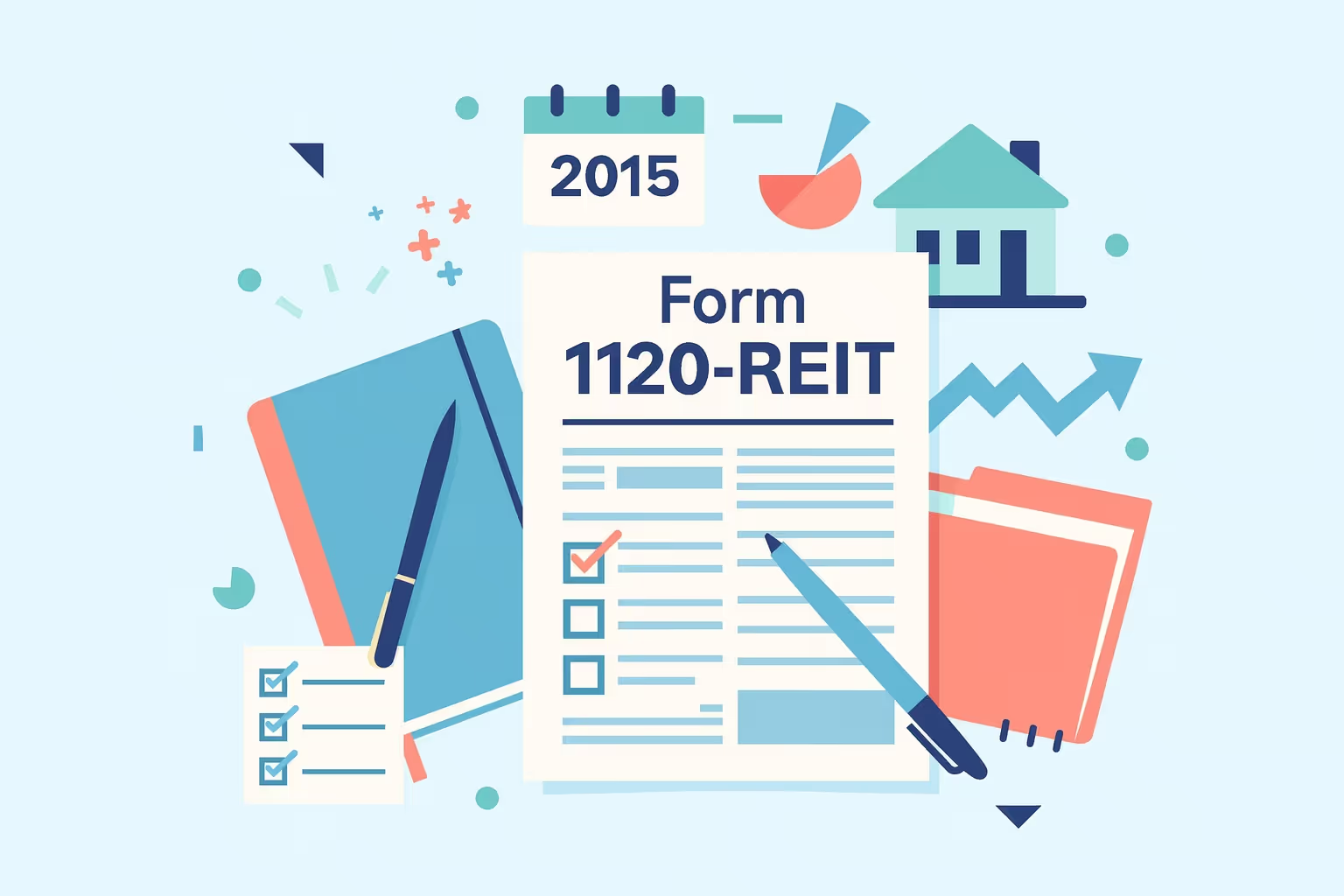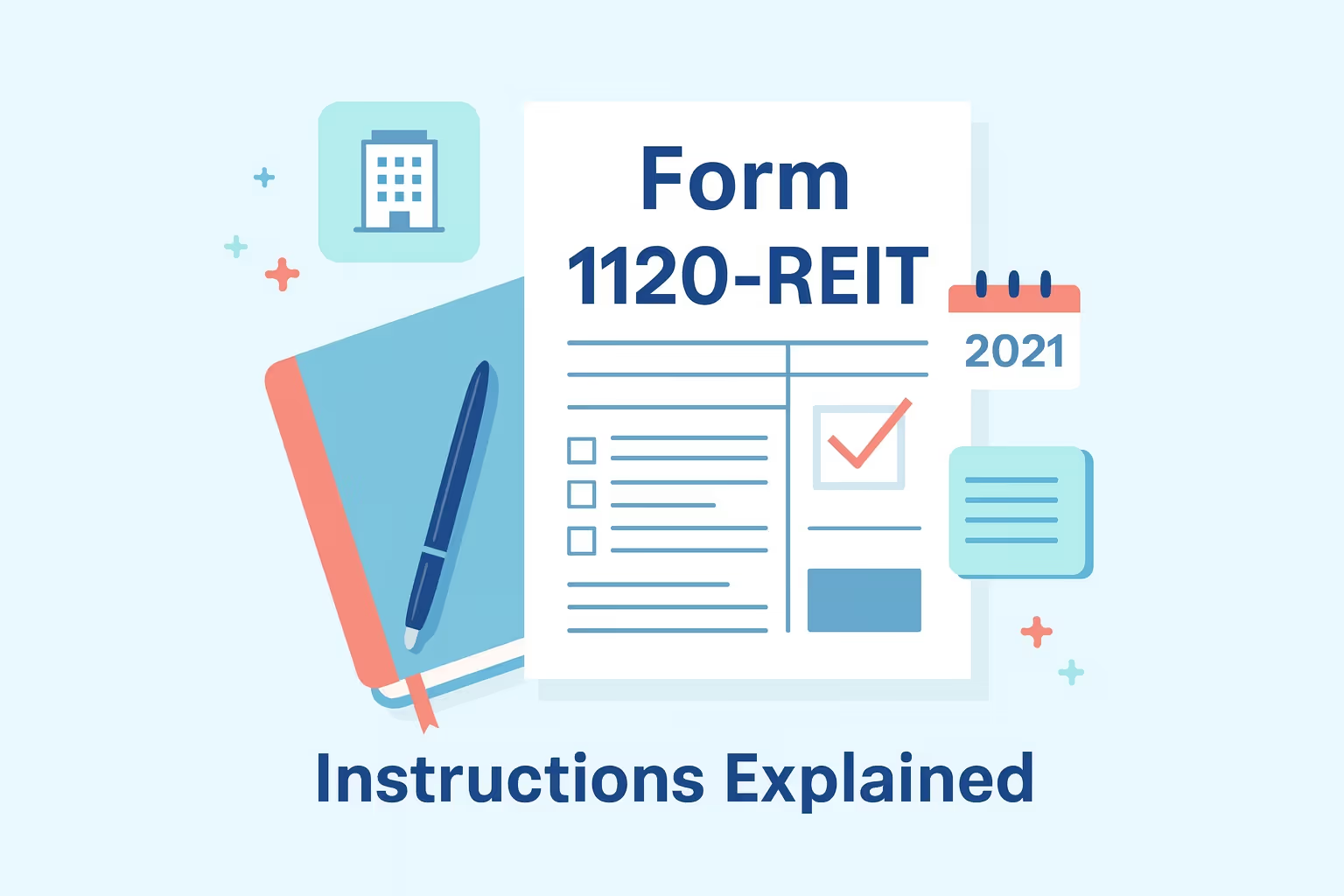
What IRS Form 1120-REIT (2025) Is For
IRS Form 1120-REIT (2025) is the annual income tax return used by a real estate investment trust to report its taxable income, deductions, credits, and capital gains to the Internal Revenue Service. A REIT must file this form each tax year to maintain its REIT status and document how it meets federal tax obligations. The form also includes schedules that outline dividend distributions, balance sheet details, and other required tax reporting information.
When You’d Use Form 1120-REIT (2025)
A real estate investment trust uses Form 1120-REIT (2025) to file its annual federal income tax return. The form reports taxable income, ordinary dividends, capital gains, and the trust’s tax liability for the year. It applies to equity REITs, mortgage REITs, and hybrid structures that must comply with IRS rules to maintain their REIT status. Visit our page that lists key IRS forms and instructions you may need when preparing or amending your 2025 Form 1120-REIT.
This form is applicable in the following situations:
- Standard Annual Filing: This form is required each tax year, even when the REIT has minimal taxable income or no tax due.
- Late Filing: You must file the form by the due date, which is either April 15, 2026, or the October 15, 2026, extension date. This rule also applies when the IRS issues a notice for an unfiled return. See our resource on how the IRS handles unfiled corporate returns, including what to expect if a past-year 1120-REIT still needs to be submitted.
- Amended filing: You must file an amended return when you need to correct taxable income, update capital gains, revise dividend distributions, or modify qualification test calculations.
- Refund claims: You file the form to recover estimated tax payments or withholding for years that were not previously filed, as corporate returns follow different timing rules.
Key Rules or Details for 2025
Several rules apply when completing Form 1120-REIT (2025). These details enable a real estate investment trust to report income accurately and maintain its REIT status under IRS regulations.
- Updated penalties: The IRS sets a minimum late-filing penalty of $510 or the tax due, whichever is smaller, for returns filed more than 60 days after the due date. Learn more in our guide that explains how the IRS reviews late or amended business returns and why REITs sometimes receive follow-up notices.
- 90% distribution rule: A REIT must distribute at least 90% of its taxable income, not including net capital gains, to keep its status.
- Income tests: The 95% and 75% gross income tests apply to income from rents, interest, dividends, and other qualifying sources tied to real estate investments.
- Asset diversification: A REIT must meet asset mix rules that limit the amount that can be invested in assets other than real estate.
- Calendar year requirement: Most REITs must use a calendar tax year, unless they qualified for an alternative method before the long-standing exceptions took effect.
- Accounting threshold: REITs with average gross receipts of $30 million or more must use the accrual method of accounting.
- Foreclosure property rules: Income from foreclosure property is taxed separately and must be reported in the proper section of the return.
Step-by-Step (High Level)
Step 1—Get IRS Transcripts
Start by requesting IRS account transcripts to confirm payments, penalties, capital gains taxes, and any prior filing activity. This helps you verify ordinary income, adjustments, and any previous tax deduction claims related to the REIT’s return.
Step 2—Complete the Correct Form Year
Use the official 2025 Form 1120-REIT and follow the instructions on tax rates, corporate income tax, and REIT-specific rules. As you calculate REIT dividends, ordinary REIT dividends, and income tax liability, remember that correct reporting supports the REIT’s tax benefits and may affect the qualified business income deduction for some REIT investors.
Step 3—Attach All Required Schedules
Attach schedules for income, capital gains taxes, and balance sheet items, plus any other required forms referenced in the instructions. These schedules show how the REIT will pay corporate income taxes on its taxable income from ordinary income, rents, and sales of real estate investments.
Step 4—File Electronically or by Mail
You can e-file or mail the completed form to the address listed in the instructions for the appropriate IRS office. If you send the return, use tracking so you can prove that you paid taxes and filed on time.
Step 5—Keep Copies and Documentation
Keep copies of the return, schedules, and support for REIT dividends, asset values, and key calculations. Detailed records help a tax advisor provide accurate tax advice if the Internal Revenue Service questions the filing or if you need to amend a later tax year.
Common Mistakes and How to Avoid Them
- Incorrect cost basis reporting: Misstating the cost basis of properties or securities the REITs invest in can distort gains or losses. Keep detailed purchase records and verify all figures before filing.
- Dividend reporting errors: Mistakes often occur when listing qualified dividends, REIT shares, or distribution amounts relied on by REIT shareholders and individual investors. Compare totals with internal statements to avoid discrepancies.
- Overlooking deductions and timing rules: Some filers miss eligible itemized deductions, use the incorrect fiscal year, or fail to account for changes tied to the Jobs Act, which can impact the REIT’s tax situation. Review IRS updates each year.
- Misclassifying REIT’s income: Errors appear when REIT’s income varies or when the monthly basis cash flow differs across properties. Maintain organized income records and follow IRS definitions.
- Account-related issues: Problems arise when REITs rely on banking services, direct deposit, or accounts used like a savings account to track payments and service fees. Reconcile accounts regularly to avoid mismatches.
What Happens After You File
Once Form 1120-REIT is filed, the IRS reviews the return and updates its records for the tax year. Processing may result in a refund, a balance due notice, or confirmation that the return has been accepted. If tax is owed, the REIT can request a payment plan. Interest continues to build on unpaid amounts, so reviewing IRS notices promptly helps prevent additional charges or delays. Visit our penalty abatement page to see when a REIT may qualify for relief if the 2025 income tax return is filed late or corrected after the deadline.
FAQs
How does a real estate investment trust handle a late income tax return?
A real estate investment trust can file a late return by submitting Form 1120-REIT as soon as possible. Filing stops additional late-filing penalties, and the IRS will calculate any remaining balance due.
Do real estate investment trusts report capital gains separately on Form 1120-REIT?
Yes, capital gains are reported on the appropriate schedules, along with supporting details for sales of properties or securities during the tax year.
What should REIT investors know about ordinary income reported on this form?
The form shows the amount of ordinary income the trust earned for the year, which helps REIT investors understand distributions and confirm how those amounts should be reported on their personal tax returns.
Can filing this form help a trust maintain tax advantages?
Accurate reporting helps protect tax advantages associated with REIT status, including distribution requirements and rules governing qualifying income.
How does an estate investment trust REIT confirm compliance with IRS rules?
It confirms compliance by reviewing income sources, asset composition, and distribution totals before filing, which supports ongoing qualification under IRS standards.


































